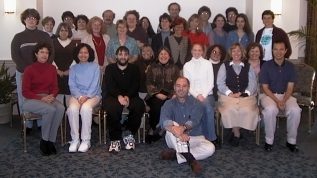History
University Centers for Excellence in Developmental Disabilities grew out of President John F. Kennedy’s commitment to individuals with disabilities. In 1962, President Kennedy established the President’s Council on Mental Retardation. This panel was charged with a mission to examine the needs and services available for individuals with mental retardation and developmental disabilities, and to present recommendations for public policy in this area. As a result of the panel’s work, Congress passed Public Law 88-164, the Mental Retardation Facilities and Community Mental Health Centers Construction Act in 1963.
During 1990-1991, Lucille Zeph, Ed.D., UMaine associate professor of education who established and coordinated graduate education in severe disabilities, led a statewide stakeholders group through a year-long planning process to establish the vision, mission, purpose and goals of what would become the Center for Community Inclusion (CCI). The effort was supported with funding from the Maine Developmental Disabilities Council.
The Center for Community Inclusion (CCI) was established as a University Affiliated Program or UAP in 1992 with core grant funding awarded to the University of Maine by the U.S. Department of Health and Human Services, Administration on Developmental Disabilities.
Dr. Zeph was named CCI Director in September 1992 after a national search. CCI began with a handful of faculty and staff, two borrowed offices on the University of Maine campus, and a budget of $150,000.
Today, the Center for Community Inclusion and Disability Studies is an innovative interdisciplinary center that supports teaching, research and community engagement activities for an interdisciplinary team of 14 faculty and staff through a diverse portfolio of grants and contracts that account for nearly $1,800,000 in extramural funding. FY2017 represented CCIDS’ 25th year of continuous federal competitive core funding as Maine’s UCEDD.





